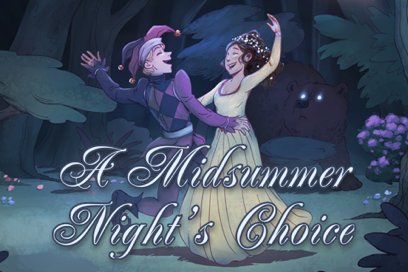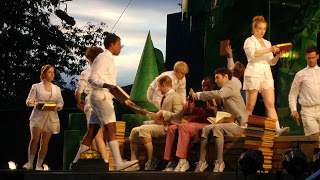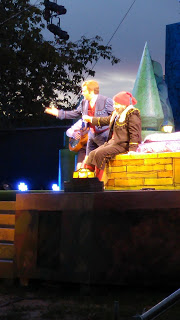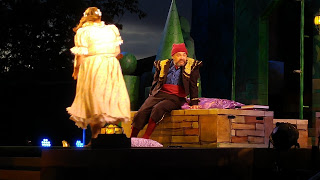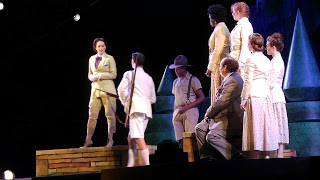I’ve lost count of how many times I’ve been to see free Shakespeare under the stars courtesy Commonwealth Shakespeare. I’ve been telling people 13 years, I’m pretty sure that’s right.
This year we’ve got Love’s Labour’s Lost, which is one of those “Really?” kind of choices because no one other than existing Shakespeare geeks is going to know anything about it. But I suppose by that logic they’d just rotate through Romeo and Juliet and Hamlet every year, so they’ve got to dip into the other works regularly. (This company has also recently done Two Gentlemen of Verona and All’s Well That Ends Well, so they’re not afraid to explore the canon. Both of which I saw, by the way.) At least I can add this one to my list, having never seen a production. Technically I saw half of one once, but that’s a story for another day (actually it’s a story from years ago that I no doubt posted when it happened).
Anyway, here’s how I’ve tried to explain LLL to people when they inevitably say, “ooo, I’ve never heard of that one” …
The play opens with the king and three of his followers deciding to swear off women for the next three years. They’re going to do nothing but study, no women in sight. So, of course, four attractive single ladies immediately show up on the scene and you can imagine that antics that follow. Each of the guys falls in love with one of the girls and goes about trying to woo her, without letting his fellows know that he is breaking the oath that they all took. Love notes are written and secretly passed, the messenger gives the wrong note to the wrong girl, and silliness follows. It all gets straightened out at we end with the promise of a wedding, as all the comedies do.
It’s not one of Shakespeare’s greatest, which is probably obvious given that nobody’s heard of it. If it’s famous for anything it is for the complicated word games all throughout it where Shakespeare was showing off exactly what he could do, including an appearance by the word “honorificabilitudinitatibus.” So it can be hard to follow, and productions will rely on over the top physical comedy to keep the audience interested and laughing.
Kenneth Branagh made a movie version, but it didn’t do so well. I couldn’t tell you whether that’s because it wasn’t a good version, or it just reinforces the fact that nobody recognizes this play. I didn’t see it.
A coworker saw the play before I did. I asked him, “And were you able to follow it?”
“Mostly,” he said, “But my wife and I weren’t paying all that much attention, we were just having a picnic with our wine and dinner and enjoying the evening.”
Another coworker didn’t even realize that’s how it works. She thought this was a closed, ticketed event. “Oh no,” I tell her, “This is Boston Common. People will be walking around right through the crowd. People on their bikes, walking dogs … people will just stop and take in the show for a little while.”
I asked for more details about the show from the coworker who’d seen it. “I was surprised by just how … bawdy? it was. *Lot* of penis jokes in this one. Is Shakespeare always like that?”
I didn’t recall this one being especially over the top, so I said, “He can be. But it’s also the kind of thing the director will play up to get a laugh out of the audience.”
“Even my wife said, ‘I thought this was family friendly, there are kids here!'”
I later learn that one of my other coworkers was in acting classes with Remo Airaldi, one of the clowns in the group who will be playing Don Adriano de Armada. That should be interesting!
So, that’s what I had to work with going in to the show. My wife and I decided to skip the picnic this year and just get dinner beforehand, so we grabbed some lawn chairs and found a nice spot house right, under a shady tree, and hunted Pokemon while waiting for the show to begin.
I thought the scenery was excellent this year. Most years they go with some sort of “decorated scaffold” sort of thing where it’s obvious that there’s a center exit, and some sort of upper level. I don’t even know what they were trying to go for here – is it a castle? a forest? A wall? All the above? It looks a bit like the Emerald City. But I like it!
The play opens with a dumb show that gets the point across quite nicely – three gentlemen sit studying a growing pile of books, while random people dance in and out, constantly swapping the book or adding more. Every time a pretty girl goes by, the men are distracted from their studies. Pretty soon the random people are wandering in with food and pillows and it’s a blur – we’re studying too much and not eating or sleeping enough, which is pretty spot on.
It’s obvious that Biron (or Berowne, if you prefer) is going to get all the stage time, while Dumain an Longaville are basically just sycophantic yes men who literally trip over themselves to do whatever the king wants. That’s not their fault, though – that’s all Shakespeare gave them to work with. But Biron carries the opening scenes nicely. He makes a good lead.
Enter the princesses, and I have a question. I don’t usually get into racial issues and color blind casting, but it bothered me, so why not bring it up? It just so happens that the actor playing Biron is black. Fine. But when the four ladies enter, wouldn’t you know it, one of them is black as well and of course she’s Rosaline, who is matched with Biron, and I’m left thinking, “Really??” I thought these days we’re beyond that simplistic “gotta match the black guy up with a black girl” logic? I want to give them the benefit of the doubt here, though. After thinking more about it, each of the princesses is a physical match to the gentleman each is paired with, which is certainly not a coincidence. So to have both Rosaline and Biron be African American makes sense. I just wonder if I’m the only one in the audience that found it strangely racist, and whether that was the reaction the director thought he was going to get. He’s literally saying “judge these books by their covers and match the girls up with what guys you think are appropriate, based entirely on their physical appearance.”
It gets weird later during the masquerade where, if you don’t know, the ladies all pretend to be each other to play a prank on the young men. So now we’ve got the one black actress pretending to be one of the others, and now we’re supposed to do the color blind thing and ignore that. Maybe it’s making a mountain out of a mole hill, but I call it like I see it, and it was distracting, what can I say.
I wanted to laugh myself silly at Don Adriano. Sometimes I did, but not much. I wish I could say otherwise. Everything was delivered in a heavy lisp where you could see the spittle spraying in the lights. He reminded me of Hank Asaria’s character in The Birdcage, if you remember that one. At some points I thought his servant Moth was more interesting – but maybe more exciting is the better word. Don Adriano just lolled around the stage moaning, while Moth was always bouncing around the edges, ready to run off and do something exciting.
A quick word about the bawdiness? I get what my coworker meant. I didn’t think it was bad – I’ve seen worse. There’s a particular dialogue in The Comedy of Errors that has more sex jokes than I think this whole play has. But there were a couple of instances where, unless I’m drastically misreading the move, a male character has a moment to describe the woman he loves, and halfway through his speech he grabs a pillow or book to hold in front of his crotch, like a middle school student called up to complete a math problem on the whiteboard in front of the class right after the pretty girl that sits next to him dropped her pencil. If you get my drift. When I saw that move twice I was rolling my eyes. Shakespeare gave you so little to work with?
Anyway, back to the good stuff. I thought all the character casting was excellent (racial worries aside). Rosaline was excellent. I wanted to make some Beatrice/Benedick references, but this Rosaline would have sent Beatrice home whimpering. She brought some serious attitude and it did work. The Princess was equally good, verbally sparring with Ferdinand. Even Boyet was spot on.

All in all I just didn’t love it, compared to many of the other shows I’ve seen here. I think the material has a lot to do with that. The only real laughs came from the physical setup — Biron’s reveal when he discovers Ferdinand, Longaville and Dumain have all broken the oath is perhaps the funniest moment in the entire play. I laughed a little at Holofernes – a little. Which is a shame, because Fred Sullivan, Jr has always been the comic star of Commonwealth Shakespeare and having seen his Jaques, Malvolio and Nick Bottom, I hate to see his delivery reduced to just yelling and repeating himself. Oh, and occasionally whacking people with a ruler. Funny gimmick, got old fast. I didn’t even really laugh at the Nine Worthies. I spent too much time thinking, “Well, this is like a light version of Midsummer.” And then *bam* right in the middle the scene just stops, we learn that the princess’ father has died, and it switches over to a funeral as all the characters don black robes and the whole mood just goes right out the window. I realize that this is how Shakespeare wrote it, but I don’t get the point of sending the audience home depressed. There’s one funny line to wrap up, where Biron says something about waiting a year and how “that’s too long for a play”. People laughed at that. But that was it, time to go home.
Going into an evening like this, and coming out of it, I can say the same thing: Shakespeare makes life better. This evening is one of the highlights of my year, and it doesn’t matter whether they performed LLL or Merry Wives of Windsor or Two Noble Kinsmen. The fact they perform it is what matters. Every year they give it their all and I appreciate the hell out of it. It’s free for heaven’s sake. Do like my coworker did, go have a picnic and drink some wine with your significant other, and if you want to laugh at the dirty jokes, go for it, that’s what they’re there for. Shakespeare as backdrop makes for a lovely evening.



